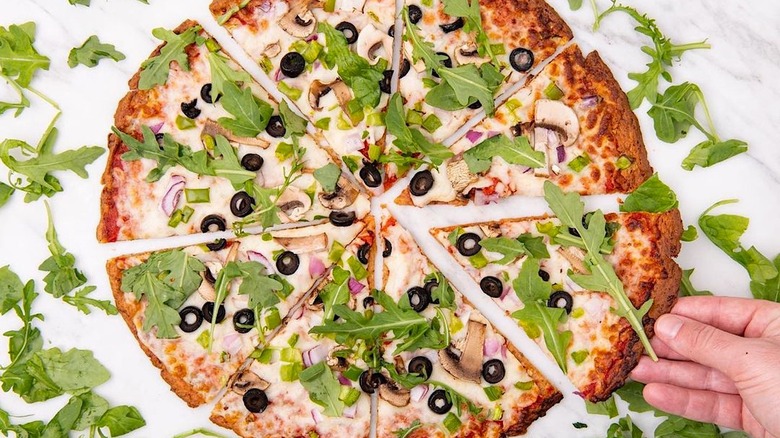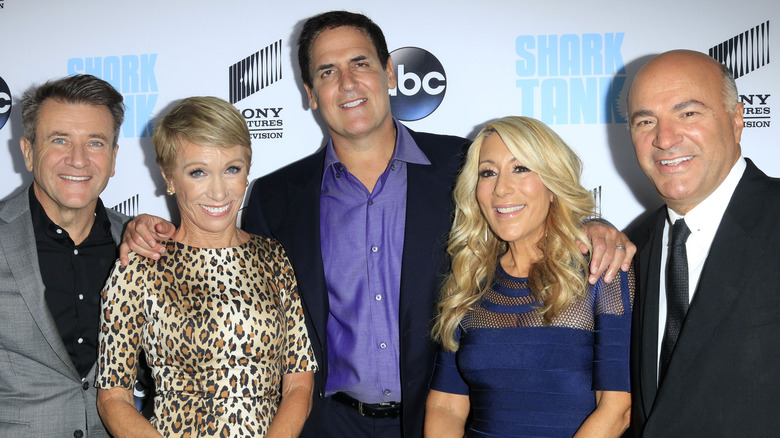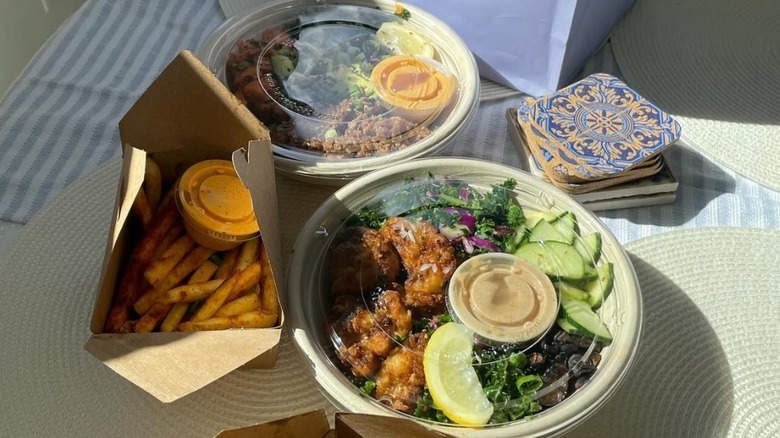Salted: Here's What Happened After Shark Tank
Not all restaurants involve an actual dining experience in a physical venue. You can't visit virtual restaurants, also known as ghost kitchens or dark kitchens, because they're digital-only restaurants that offer food you can order via delivery apps, such as Uber Eats or DoorDash. It's a business model that saw a huge spike during the pandemic; meal delivery services grew 162% in April 2020 compared to the previous year according to Bloomberg Second Measure, and it's still increasing each year — though at a somewhat slower and steadier rate.
Back in 2014, the kitchen-without-a-dining-room concept inspired entrepreneur Jeff Appelbaum to launch Salted. The umbrella restaurant company was all about offering more nutritious options for pick-up and delivery, with no available dine-in services.
By 2020, Appelbaum had grown the business to six restaurant brands — Cauliflower Pizza, Moonbowls Korean Cuisine, Ginger Bowl Chinese Cuisine, the $5 Salad Company, F/ck Gluten, and the keto-friendly Thrive Kitchen — which operated from Los Angeles, San Francisco, Chicago, and Columbus. Believing the technology-focused model was how more restaurants would look in the future, he headed to "Shark Tank" seeking an investment to expand Salted.
What happened to Salted on Shark Tank?
Salted appeared on season 11, episode 23 of "Shark Tank" asking for a $500,000 investment in return for a 5% stake. Founder Jeff Appelbaum explained that this was the third iteration of the business, which had previously focused on offering online cooking classes and meal kits before its current restaurant delivery services.
The brands in the Salted family all focused on different variations of more nutritious fast food options, from gluten-, soy- and nut-free cauliflower pizza to a Californian take on Korean bowls and affordable salads. The Sharks tried some samples and enjoyed the dishes — especially Lori Greiner, who claimed this type of venture was perfect for her as she was a target consumer.
Salted was funded by venture capital partners. The company had made $1.1 million in sales the year that it appeared on the show, and it had a $3 million run rate, which was a good indication of its future performance. But it had also lost $750,000 during the year the episode was filmed, which concerned the Sharks, especially as the investors had not yet seen a return. All Sharks were out save Greiner, but because Appelbaum had ignored and talked over her, she refused to invest. In the end, the company left without a deal, with reasons ranging from how competitive the market was to Appelbaum's lack of SEO strategy and how his frenetic energy made certain Sharks nervous.
Salted after Shark Tank
Salted may not have received investment from the Sharks, but it went on to see success following the show. In May 2021, a year after the episode aired, the company managed to secure $9 million in seed financing from partners including Kamine Development Corporation, Craft Ventures, Valor Equity Partners, Proof Ventures, and Wonder Ventures. The business had 17 locations across the country by that point and aimed to have 80 by the next year.
The company continued to grow with a new round of investment in October 2021. By this time, Salted employed 200 people, with 19 locations serving food in seven states. Together, the restaurants brought in between $1 million and $2.5 million in annual sales.
In addition to growing its delivery-focused kitchens, Salted also opened its first brick-and-mortar Moonbowls storefront in Los Angeles in 2021. Founder Jeff Appelbaum had grand plans; the entrepreneur told QSR magazine that delivery was just one facet of the business strategy, and the long-term aim was to create "multi-channel brands that will be around in 50 years."
Is Salted still in business?
Salted is still in business and runs six different restaurant brands. These include the Hawaiian-inspired Lulubowls alongside Califlower Pizza, Moonbowls, Ginger Bowls, the $5 Salad Company, and Thrive Kitchen. The company operates in Austin, Atlanta, Los Angeles, San Francisco, Chicago, Columbus, Houston, Philadelphia, and New York, and plans to have 60 locations live in 2024.
In October 2023, Salted secured another $14 million in funding. The individual restaurants were all profitable at this time and were bringing in around $1 million in sales each annually. While the umbrella company itself is not active on social media, its Moonbowls brand has almost 10,000 followers on Instagram – where it features special offers for occasions such as Father's Day or New Year as well as promoting its delivery options and event catering services.
In the fall of 2023, CEO Jeff Appelbaum had plans to expand and diversify the business model further with the brand's first acquisition, a Mediterranean-inspired restaurant called Xenia. By November 2023, this new external acquisition was offering a menu including pita, crispy falafel, and tzatziki across six Salted locations.
What's next for Salted?
As Salted continues to grow, so too do founder Jeff Appelbaum's plans for the future of the company. Following the latest round of funding in October 2023, the entrepreneur told Techcrunch that he wanted to have "thousands of locations" over the coming years. He had previously told the publication that his ambition was "building the next Chipotle" (via Techcrunch).
While the company currently only operates in the U.S. (now available in 10 states), Appelbaum also has a dream to expand operations on an international level, with a team of real estate partners looking for suitable locations. On his LinkedIn profile, he ambitiously describes Salted as "scaling tomorrow's restaurant brands."
With its focus on fast-moving technology, coupled with the lack of physical restaurant overheads, Salted could grow in all sorts of directions in the future — whether by expanding into new territories or developing and acquiring more restaurant brands. After all, the delivery model is a market that continues to flourish; as of March 2024, sales for the major meal delivery services collectively grew 8% year-over-year (per Bloomberg Second Measure).





